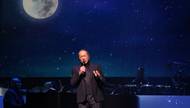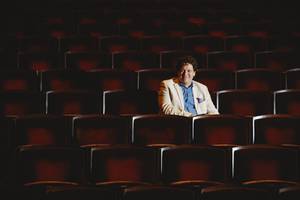The classical and hip-hop fusion duo Black Violin has quite a list of musical accomplishments. They’ve performed with Alicia Keys, toured with Mike Shinoda of Linkin Park and played for former First Lady Michelle Obama at one of President Barack Obama’s inaugural balls.
As viola player and vocalist Wil Baptiste and violin player Kev Marcus work on an album set to release this year, they’re going back on tour with “the crew”—NatStokes on drums, DJ SPS on the turntables and Liston Gregory on keyboards. Singer-songwriter Abraham Alexander is touring with the band and will open the January 30 show at Reynolds Hall.
Las Vegas is the fourth stop on their spring tour, dubbed The Experience, and concertgoers can expect an energetic and inspiring show.
“When I’m on stage … I’m not thinking of anybody else. I’m as free as a bird,” says Baptiste. “And that’s one of the things we encourage for the crowd is to let loose, be yourself, be comfortable.”
From his home in Fort Lauderdale, Baptiste talked with the Weekly about Black Violin’s upcoming album, his views on fostering creativity and connecting through music.
It’s been three years since Black Violin released an album, and now, you’re working on a new album.
We locked ourselves in the studio and started just creating. That’s something that we do on stage a lot [but] we’ve never really done that in the studio. …This time, we wanted to focus the creation mostly on the band. Everybody in the whole band comes in, we’re in the studio, and we’re just there for a week creating, throwing things at the wall. We haven’t done that before. … We jam and have fun and move around and play music on stage all the time, but not in a controlled environment with this purpose to create an album.
The concept of the album is just the idea of being free. What does that sound like? What does it mean to you?
Black Violin breaks the boundaries of musical genres. Is it challenging to go against the grain of conventions?
The idea of taking this instrument and playing something other than classical is something that we’ve always done. … It’s almost like it was a defense mechanism. We grew up in Fort Lauderdale. We went to a predominantly Black and brown school. … But outside of that, there weren’t a lot of kids that looked like us playing. I think hip-hop was such a huge influence. Hip-hop is the rebel; “I’m gonna take this thing and rip it apart and put it together in ways that I want to.”
So the idea of taking this instrument and playing hip-hop wasn’t even a question. It was extremely instinctive [and] natural for us to do it. … Creating is just the same thing. The process is literally like, ‘Oh, this sounds dope. Build a beat on top of it. I can freestyle on top of it.’ ... We didn’t read a book. We didn’t see anyone do this. It was very much hip-hop and [had] a lot to do with … being yourself [by] any means necessary.
You have a nonprofit that provides scholarships for youth to foster creativity and continue their education in music. What are your views on creativity?
I think everybody has their thing, whether it’s sports, writing or talking to somebody. Music is a way for me to just open up my chest and allow you to see what’s inside. … Here’s a glimpse of me. I think to a great extent, that’s everybody. Everybody wants to be seen in some form. … And some people do it in different ways, whether it’s basketball or whatever. But I like to do it through creating.
What’s on your Spotify playlist? What inspires you?
Curtis Mayfield is one of my favorite artists that I listen to almost daily. I listen to [John] Coltrane a lot. … I listen to a jazz album by a group by the name of Phi-Psonics. … I don’t listen to a lot of hip-hop, unless it’s something I know I’m going to like, like To Pimp A Butterfly [by Kendrick Lamar] or Like Water for Chocolate [by Common]. If it’s not feeding me or doing anything for me, I’m not trying to listen to it. …
You are what you eat. I’m not saying I’m consuming the most refined and perfect meal when it comes to music. But as I get older, I’m very selective about what I listen to. It has to just do something for me. And nostalgia has a lot to do with it. … I still listen to a lot of it that still makes me feel the same way, the Motown eras and the Marvin Gayes and Aretha Franklins of the world.
If you could watch any hip-hop artist and a classical musician meet for dinner, who would you want to see?
I would love to be in the space of when Aquemini was put together. What went through their mind as [Outkast was] constructing this record? As far as classical, one of my favorite composers is [Dmitri] Shostakovich. Funny thing is, I hated his music at first. I thought it was like the worst music in the world until I heard his story. When I got to understand his story, then I got to understand the music a lot more.
Black Violin not only helps foster creativity but also connection through music. What does connecting with listeners mean to you?
My proudest moments are when people come up to me and tell me, “I was in prison and your music got me through this thing.” There’s no greater compliment, as I’m doing this thing … that comes naturally for me. Somehow it’s allowing you to feel like, “I can push through,” and get to live another day or deserve to live another day. There’s nothing else that can top that. That’s why I keep doing what I’m doing.
BLACK VIOLIN With Abraham Alexander. January 30, 7:30 p.m., $39. Reynolds Hall, thesmithcenter.com.
Click HERE to subscribe for free to the Weekly Fix, the digital edition of Las Vegas Weekly! Stay up to date with the latest on Las Vegas concerts, shows, restaurants, bars and more, sent directly to your inbox!








